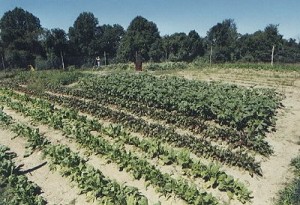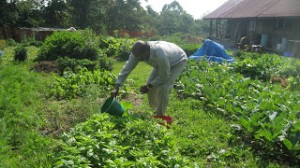Irrigation Comes to the Garden of 7 Gates
or “How Tapahpunjah didn’t let the drought of 2012 hold him back”
by Lilasuka dasi
Farmers talk a lot about the weather. But it’s not just small talk. Krsna sends weather that can make or break the success of a whole season’s worth of crops. Farmer and New Vrindaban resident Tapahpunjah Prabhu was very concerned about the droughts we experienced in New Vrindaban this summer.
Tapahpunjah Prabhu explains: “Many crops, such as carrots and beets, require continuity of moisture supply in order to grow properly. With the sporadic moisture of this past summer, many plants in the Garden of 7 Gates (G7G) became stressed, and suffered. Since a major goal of our gardeners this year is to boost the production capacity of the garden, as well as to regulate the pace of the crop growth no matter what the weather, irrigation has become a necessity.”
New Vrindaban’s “ECOV” Board has made the decision to sponsor a new irrigation system. ECOV, also known as “GITA”, is one of the two boards that govern the New Vrindaban community and it consists of five members and two advisors, who meet twice a month. ECOV deals with projects related to the cows and the agricultural land in NV, so they hired a very successful local farmer, Andy Reed, to design and install the irrigation system at the G7G.
Andy explains: “The irrigation system consists of one 500’ main trunk extending from one end of the field to the other. From the main branch, at regular intervals, there are a total of 1400’ of sub branch lines going out to the beds.
The water will come in to the G7G to this main branch that I’m digging right now, and then there will be either drip type or sprinkler type lines extended out to each bed.”
Our garden at New Vrindaban produces not only vegetables and berries, but also beautiful flowers for the Deities. The G7G covers six acres. It is the biggest sustainable garden involved in the “Green Wheeling Initiative,” an organization created by Tapahpunjah prabhu to make people in our local area of Wheeling aware of the value of fresh fruits and vegetables for nutrition as well as to educate the neighbors about the relationship between food and karma.
This year’s harvest from the G7G included: about 60 bushels of tomatoes, 85 boxes of chard, 25 bushels of cucumbers, 17 bushels of okra, 60 bushels of bell peppers, 12 bushels of jalapenos, 65 bushels of zucchini, 5 bushels of bitter melon, 40 bushels of butternut squash, 20 bushels of pumpkin, 20 boxes of mustard greens and a lot of green beans.
In the Bhagavad Gita [10.35], Lord Krsna promises: “I am flower-bearing spring.” When the irrigation system is in place by next spring, our garden will produce much more. To help towards this goal, we are researching how to boost the soil fertility levels.
The future of Krsna’s garden is bright.
Tapahpunjah exclaims: “The G7G is a flat field. This is rarely to be found in these hills of WV, so this was a very popular field in the past. As a result, it was often overplanted, and also suffered from poor farming practices. We have taken 12 years to get the fertility back to the level at which it is today and we are still improving it.”
We offer our thanks to the ECOV board, and to Tapahpunjah and Andy and his crew for helping to bring life-sustaining water to Krishna’s garden.




